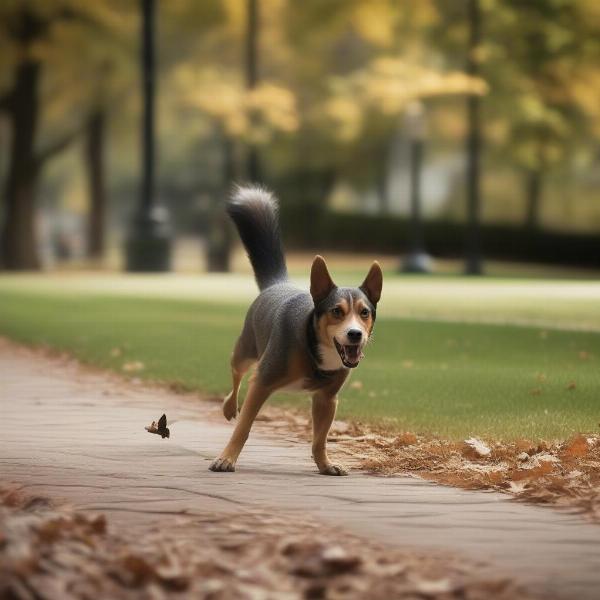A dog’s natural instinct to chase can lead them straight to squirrels. While usually harmless fun, sometimes this pursuit ends in a squirrel bite. Understanding why dogs chase squirrels, the potential risks of a bite, and how to prevent these incidents is crucial for responsible dog ownership. This article explores these topics, offering practical advice for keeping your canine companion safe and happy.
Why Do Dogs Chase Squirrels?
Dogs chase squirrels due to a combination of instinct and prey drive. Squirrels’ quick, darting movements trigger a predatory response in many dogs, activating their ingrained chase reflex. This instinctual behavior can be further fueled by the thrill of the chase and the dog’s natural curiosity. For some breeds, like terriers, this prey drive is particularly strong, making squirrel chasing a common occurrence.
The Risks of a Squirrel Bite to Your Dog
While often seen as harmless, squirrel bites can pose several risks to your dog. Squirrels can carry diseases like leptospirosis and Lyme disease, which can be transmitted through a bite. Additionally, a squirrel bite can cause localized infections due to bacteria present in the squirrel’s mouth. Beyond physical harm, a dog persistently chasing squirrels might run into traffic or other dangers, increasing the risk of injury.
Preventing Squirrel Bites: Practical Tips
Preventing squirrel bites involves managing your dog’s behavior and creating a less squirrel-friendly environment. Here are some practical tips:
- Training: Obedience training, particularly a solid “leave it” or “come” command, can help you regain control of your dog when they spot a squirrel. Consistent training reinforces your leadership and helps your dog understand boundaries.
- Leash Control: Keeping your dog on a leash, especially in areas known for squirrel activity, is essential. This prevents them from engaging in chases and potential bites. A short leash provides better control.
- Environmental Modifications: Make your yard less attractive to squirrels by removing food sources like bird feeders and securing garbage cans. This reduces the likelihood of squirrels frequenting your property.
- Distraction Techniques: Carrying high-value treats or toys can help distract your dog when they notice a squirrel. Redirecting their attention can prevent them from fixating on the squirrel.
- Positive Reinforcement: Reward your dog for ignoring squirrels or responding appropriately to your commands. Positive reinforcement encourages desired behaviors.
What to Do If Your Dog Gets Bitten by a Squirrel
If your dog does get bitten by a squirrel, it’s essential to take prompt action:
- Clean the Wound: Gently clean the wound with mild soap and water.
- Monitor for Infection: Watch for signs of infection like redness, swelling, pus, or lethargy.
- Consult Your Veterinarian: Schedule a vet appointment for a thorough examination and appropriate treatment. Your vet may prescribe antibiotics or other medications.
Can a Dog Lunging at a Squirrel Be Dangerous?
Even if a bite doesn’t occur, dog lunging at a squirrel can be dangerous. Sudden lunges can strain or injure your dog, especially if they are on a leash. Furthermore, a lunging dog can pose a risk to nearby people or other animals.
 Dog lunging at a squirrel in a park
Dog lunging at a squirrel in a park
Conclusion
While the sight of a dog chasing a squirrel can be amusing, it’s important to understand the potential risks involved. By implementing preventative measures and understanding how to react in case of a bite, you can help keep your furry friend safe from the dangers of dog squirrel bite incidents. Prioritizing training, leash control, and environmental modifications can significantly reduce the risk and ensure your dog’s well-being.
FAQ
- What diseases can squirrels transmit to dogs? Squirrels can carry diseases like leptospirosis, Lyme disease, and rabies.
- Should I be concerned if my dog chases squirrels constantly? Yes, this behavior can lead to injuries or bites. Training and leash control are essential.
- What should I do if my dog eats a dead squirrel? Contact your veterinarian immediately. Dead squirrels can carry parasites and diseases.
- Can a squirrel bite break a dog’s skin? Yes, squirrel bites can puncture the skin and cause wounds.
- Are there any dog toys that can mimic squirrel chasing? Yes, squirrel dog toy can provide a safe outlet for your dog’s prey drive.
- Is it normal for a dog to be fascinated by squirrels? Yes, it’s a natural instinct for many dogs.
- Can training completely eliminate a dog’s desire to chase squirrels? While training can help manage the behavior, it may not completely eliminate the instinct.
Related Articles
About ILM Dog
ILM Dog (ilmdog.com) is your trusted global resource for expert dog care advice. We offer comprehensive information on dog breeds, health, training, nutrition, grooming, and much more to help you provide the best possible care for your canine companion. From puppy care to senior dog support, ILM Dog is committed to empowering dog owners worldwide with practical, reliable information. Contact us for personalized advice: Email: [email protected], Phone: +44 20-3965-8624.